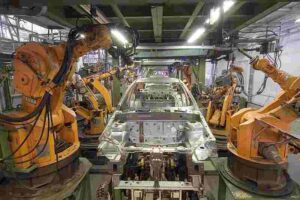5 Artificial Intelligence Benefits Explained
Artificial intelligence benefits are; increased productivity, rapid decision-making, innovation facilitation, complex problem-solving, and versatile application.
This article discusses artificial intelligence benefits, as follows;
1). Increased Productivity (as one of the Artificial Intelligence Benefits)
Artificial intelligence can increase productivity and revenue by up to 40%, through its rapid data-handling functionality.
The role of AI in productivity enhancement can be used in the context of commerce, construction, smart home management and energy management, among others.
Several capabilities of artificial intelligence can directly account for its high productivity compared to humans.
In industries, AI is behind many productivity-enhancing tools, concepts and practices, such as sustainable manufacturing by multitasking and automation [1].
Artificial intelligence can be used to automate some practices that are crucial to the establishment of a green and circular economy; such as recycling. It can be used to increase productivity during the extraction and refining of energy resources, and is a component of smart grid networks for efficient handling of electricity and conservation of energy.

2). Rapid Decision-Making
Artificial intelligence can play a major role in decision-making.
The speed of decision-making with artificial intelligence is increased by its efficiency at handling datasets.
Specifically, machine learning is the branch of artificial intelligence used in decision-making.
Areas where rapid AI-enabled decision-making is used include; predictive analysis, anomaly detection, and disaster-risk management [2].
By efficiently analyzing datasets, AI can make decision-making much quicker, and can reduce the delay and errors that are associated with human deliberation processes [7].
3). Innovation Facilitation (as one of the Artificial Intelligence Benefits)
Artificial intelligence is itself a form of technological innovation in computer science, tools and applications.
As an innovative technology, artificial intelligence is helpful in innovation within a broad range of fields based on its ability to effectively manage and utilize data on a real-time basis.
Because of this capability, AI is applicable for recognizing trends, problems and opportunities in almost any field [4].
In the area of recognizing opportunities, artificial intelligence can achieve this on many levels, and can be integrated into research and development (R and D) projects as a tools for enhancing the effectiveness and efficiency of analysis [3].
The decision-making ability of AI is also helpful for making innovative changes by reducing the level of uncertainty involved in speculations [8].
4). Complex Problem-Solving
Artificial intelligence can help solve some complex problems such as those involving computation, multi-criteria decision-making, and functionality optimization.
Specific problems that artificial intelligence can be used to solve are hazard assessment, environmental remediation and monitoring decision-making, data recognition, and forecasting.
The ability of AI to solve problems is rooted in its data-handling function, and its versatility for both theoretical and practical roles. Often, artificial intelligence is itself a complex technology [6].
5). Versatile Application (as one of the Artificial Intelligence Benefits)
Artificial intelligence has the benefit of being a versatile technology that has multiple branches abd possible applications.
All fields in the modern society and economy can utilize artificial intelligence to increase productivity in some area or another.
Also, AI can be used at all scales of business to improve efficiency and quality of products and services [5].

Conclusion
Artificial intelligence benefits are;
1. Increased Productivity
2. Rapid Decision-Making
3. Innovation Facilitation
4. Complex Problem-Solving
5. Versatile Application
References
1). David, W.; Rovida, F.; Fumagalli, M.; Kreuger, V. (2021). "Productive Multitasking for Industrial Robots." 2021 IEEE International Conference on Robotics and Automation (ICRA), Xi'an, China, 2021, pp. 12654-12661. Available at: https://doi.org/10.1109/ICRA48506.2021.9561266. (Accessed 2 February 2023).
2). Dordevic, M. (2022). "How Artificial Intelligence Can Improve Organizational Decision Making
Forbes Technology Council." Available at: https://www.forbes.com/sites/forbestechcouncil/2022/08/23/how-artificial-intelligence-can-improve-organizational-decision-making/?sh=40883cc62a1c. (Accessed 2 February 2023).
3). Grashof, N.; Kopka, A. (2022). "Artificial intelligence and radical innovation: an opportunity for all companies?" Springer, Small Business Economics. Available at: https://doi.org/10.1007/s11187-022-00698-3. (Accessed 2 February 2023).
4). Haefner, N.; Wincent, J.; Parida, V.; Gassmann, O. (2021). "Artificial intelligence and innovation management: A review, framework, and research agenda." Technological Forecasting and Social Change 162:120392. Available at: https://doi.org/10.1016/j.techfore.2020.120392. (Accessed 2 February 2023).
5). Iftikhar, N.; Hansen, B. E.; Bøgh, S. (2021). "Concept of Easy-to-use Versatile Artificial Intelligence in Industrial Small & Medium-sized Enterprises." 30th International Conference on Flexible Automation and Intelligent Manufacturing International Conference, Athens, Greece. Procedia Manufacturing, Volume 51, 2020, Pages 1146-1152. Available at: https://www.sciencedirect.com/science/article/pii/S2351978920320187. (Accessed 2 February 2023).
6). Joshi, N. (2019). "7 Types Of Artificial Intelligence." Available at: https://www.forbes.com/sites/cognitiveworld/2019/06/19/7-types-of-artificial-intelligence/?sh=450f2b9e233e. (Accessed 2 February 2023).
7). Phillips-Wren, G.; Jain, L. C. (2006). "Artificial Intelligence for Decision Making." Lecture Notes in Computer Science 4252:531-536. Available at: https://doi.org/10.1007/11893004_69. (Accessed 2 February 2023).
8). Truong, Y.; Papagiannidis, S. (2022). "Artificial Intelligence as an Enabler for Innovation: A review and future research agenda." Technological Forecasting and Social Change 183(October). Available at: https://www.sciencedirect.com/science/article/abs/pii/S0040162522003766. (Accessed 2 February 2023).